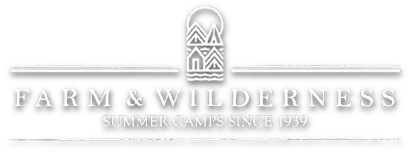Farm & Wilderness strives to better understand the impacts our farm has on the environment. Farms of all sizes have an opportunity to be deeply connected to surrounding communities and provide beneficial services, and the collaboration is not always obvious. A pasture can be managed to increase a diversity of plant species and a wetland can be left undeveloped to benefit downstream neighbors, all while producing food and fiber that feed our bellies and engage our sense of wonder for the natural world.
We aim to better help the communities integrated within the farm system. At any given point in the year, our farms have an impact on the local environment. It takes work and accountability to increase the benefits and mitigate the waste caused by those impacts. During summer camp sessions, we involve campers of all ages in the processes and challenges of running a healthy and ever-improving farm. One huge way we do this is through our composting program.
During the Spring, the farm team strives to make a healthy, nutrient-packed compost for the vegetable gardens. As the weather warms and the grass turns green, the Farm & Wilderness goats, milk cows, and other fluffy critters are sent out to pasture to harvest their own feed and spread their manure –– without the use of fossil fuels. The winter’s manure piles are turned with a tractor and the temperature is monitored. The compost piles from the previous year are the first to be spread on the fields. Finding the right weather conditions to spread manure is essential to create room for another cycle of nutrient management for the compost bays. By the time our campers arrive in June, mounds of work have been done to prepare our pastures and bays for our agriculture programming.
Many campers come from households that compost regularly, but just as many have little to no experience with the process. Even the kids that compost at home may not have experience with a composting system for a farm and community of our size. Staff work to help campers at varying levels of familiarity understand the composting process. Campers learn what does and does not belong in our compost, the process that turns leftover oatmeal into soil, and get hands-on experience every step of the way.
Each camp meal we prepare and enjoy together will have kitchen scraps, and unfinished meals that need to be disposed of in some fashion. The goal is to have a farm well-equipped to take this waste stream and integrate it into the already existing compost system.
After dinner, campers take turns or volunteer to do compost runs to Tamarack Farm, which hosts the central collection site. Counselors join in the trek rain or shine to deliver the meal’s compost before evening activities begin. This is also a time to reflect on the waste (or lack thereof) a meal created –– were there two buckets of compost to deliver after dinner? Twelve? Campers learn to evaluate the community’s role in waste production and mitigation. After all, hauling twelve buckets of compost in the flatbed truck is no small task –– it helps drive the goal of waste mitigation home!
The buckets are dumped into the bay with animal bedding and some garden weeds. There, the mixture waits to be moved to the second bay where they will sit without new materials added to let the tiny organisms and fungi do their decomposing work. All this activity creates heat, and the farm team monitors the temperature to ensure that weed seeds and harmful pathogens will cease to be able to survive. Once the second bay has sustained the ideal temperature for multiple days, it can move the third bay and is available for adding nutrients to our gardens and pastures as needed. Teens in our agriculture immersion program get involved with this higher-level part of the process, widening their understanding of more "behind-the-scenes" aspects of the composting process.
It is our job as farmers to evolve best practices, mitigate risks, and manage the adverse reactions that sometimes come with the goal of creating safe and healthy food for our community. It is our job as educators to create honest hands-on programming for our campers to be involved as much as possible. By sharing the tangible benefits of sustainable farming with our campers, the next generation will continue to hone awareness and mitigation of waste and its impact on our communities.






